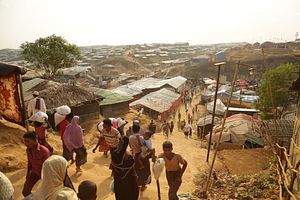The main obstacle to allowing Rohingya refugees ethnically cleansed from Myanmar to return to their homes remains the government of Myanmar. International actions aimed at addressing the crisis should reflect that reality.
The truth is clear when you speak to Rohingya refugees who continue to regularly arrive in Bangladesh, as we did last month as part of a team with Refugees International. Those remaining in Myanmar continue to face restricted movement, forced labor, and arbitrary arrest. This leaves little incentive for others to return.
It has been a year and a half since a brutal military crackdown in Myanmar’s Rakhine state, in response to attacks on security posts by a Rohingya insurgent group, caused over 700,000 Rohingyas to flee into Bangladesh for safety. Thus far, none have chosen to return home.
Despite pledges by the Myanmar government to establish conditions for safe and dignified returns, our interviews with those who had fled Myanmar just days before suggested that life for Rohingyas inside Myanmar remains dire. There has been no real accountability for the atrocity crimes committed at the height of the ethnic cleansing campaign. Instead, serious human rights violations and severe restrictions on freedom of movement continue. Additionally, the security situation in northern Rakhine is deteriorating, and humanitarian access, already highly restricted, is being further curtailed.
Following the mass exodus that began in August 2017, only a few hundred thousand Rohingyas remain in Myanmar, primarily in isolated villages in northern Rakhine state. Rohingyas have long faced state-sponsored abuse and discrimination – including the denial of citizenship. Following the events of August 2017, the Myanmar government increased movement restrictions for Rohingyas, extending nightly curfews.
Most of the Rohingyas we spoke to in Bangladesh had paid smugglers to evade the Myanmar Border Guard Police (BGP) to escape the country. They described restrictions by security forces that prevented them from working their fields or traveling to rivers to fish. One woman, who was from a village near Maungdaw town, said, “We can’t move. It’s becoming worse day by day. We can’t go anyplace without fear. Most people in the village are thinking about how they can flee.”
Recent arrivals told us that the military and the BGP would arrive at their villages at night and take people away to work as forced laborers for up to a week at a time. One young man from northern Rakhine said that he was required to do everything from carrying supplies, to cooking, to building military check posts. “When they came to the village, you had to do everything they said,” he said. “If you refused, you would be beaten seriously or maybe sent to jail.”
The situation for the Rohingyas has further deteriorated following recent fighting between an ethnic Rakhine insurgent group – known as the Arakan Army (AA) – and Myanmar security forces. Bizarrely, the military is conducting a “clearance operation” against the AA and publicly is linking the AA with Rohingya insurgents. This despite widespread anti-Rohingya sentiment among the ethnic Rakhine who make up the Arakan Army.
The impact on the Rohingyas is twofold. First, as one new arrival described to us, security forces are now accusing Rohingyas of harboring AA members in their villages and using this rationale as another pretense to harass and abuse villagers. Second, since mid-January 2019, the government has blocked access to rural areas of northern Rakhine to all but two international aid organizations, even in areas where there is no conflict. This leaves Rohingyas who have been dependent on humanitarian assistance in an even-more desperate situation.
Finally, Myanmar has done nothing to improve the situation for the more than 120,000 Rohingyas and other Muslims who have been displaced internally since 2012. They have been confined to camps for years, though these displacement sites are more open-air prison than camp. The government is moving ahead with a plan to close the camps that involves building new “villages” near the current camps while likely maintaining the same restrictions on freedom of movement. This represents a concerning indication of how Rohingyas in Bangladesh would be treated if they returned to Myanmar.
Furthermore, the Myanmar government has also done nothing to improve the underlying and systematic mistreatment of the Rohingya population. Therefore, international pressure on Myanmar’s leadership remains vital. This should include additional targeted sanctions on the leadership of Myanmar’s military, including military-owned companies, as well as support for evidence collection and accountability mechanisms, including referral to the International Criminal Court.
A spotlight must be maintained on the situation in Rakhine. There is no more time to wait and see if basic conditions will improve. If nothing changes, the potential for the return of Rohingya refugees to their homes in a safe, voluntary, and dignified manner becomes less likely by the day.
Mark Yarnell is a senior advocate and UN liaison and Daniel Sullivan is the senior advocate for human rights at Refugees International. They traveled to Bangladesh to interview newly displaced Rohingya refugees about conditions inside Myanmar in February 2019.

































